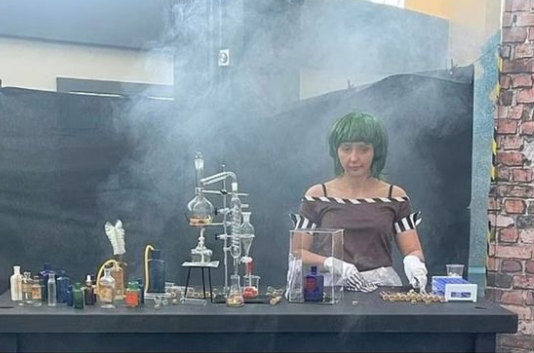
Film Critic Charley Gordon-Boyle explores the issue of AI-generated “art” – its usage in the now-infamous Glasgow Wonka Experience and beyond
We all know the cycle by now. Something funny pops up online, a bunch of people like it, and then some new content drops— a new tweet, a new angle. Suddenly even your mum wants to know what you think of the Wonka experience because her mate Caroline forwarded her something on WhatsApp. However, once brands try to get in on the joke, it’s time to pack it up. Nobody wants a feature film based on a meme.
t
Children were left in tears while parents called the police and demanded refunds from the organisers
t
If you somehow avoided the social media moment, I’ll break it down for you. Organisers advertised Willy’s Chocolate Experience as an “immersive and interactive” family experience, only for families to show up to an empty warehouse with lacklustre decoration and tiny portions of jellybeans. Children were left in tears while parents called the police and demanded refunds from the organisers. The event went viral, as Twitter hysterically fixated on a glum-looking Oompa Loompa and the original character of “the Unknown, an evil chocolate maker who lives in the walls.”
t

t
However, the meme also brought forth a valuable discussion about the recent onslaught of AI “art.” The experience was organised by the events company House of Illuminati and advertisements chock full of AI-generated images promised “the place where chocolate dreams become reality.” Posters with nonsense words were only half the problem. Actors received 15-page scripts of “AI-generated gibberish” and cheap Amazon costumes only an hour before the event opened. Promises of making children’s dreams come true could not be further from the experience’s reality and it’s almost entirely because the production relied on AI art.
t
Generative AI merely scrapes data from existing pieces and then reassembles them in a new context, often without the permission of the original creator
t
Generative AI “art” has recently broken into the mainstream with models such as ChatGPT and Dall-E presenting users with the opportunity to “create” images and text based on prompts inputted into the servers. However, traditional artists allege that there is no creativity involved in this process, as rather than providing a unique perspective that makes art a valuable reflection of the human condition, generative AI merely scrapes data from existing pieces and then reassembles them in a new context, often without the permission of the original creator. Reliance on AI models also threatens the livelihood of actual creatives and was a key negotiation point in last year’s WGA and SAG-AFTRA strikes. Hollywood bosses were attracted to AI for the same reason that the Wonka Experience organiser was — it provides an opportunity to make money without actually paying creatives.
t
Billy Coull, the mastermind behind the event, has a history when it comes to cancelled events. In 2021, he attracted controversy after cancelling a Santa’s Grotto event for disadvantaged children. He also attempted to start up a website promising to “enable even average Joe to start and grow a widely profitable business.” His use of AI also does not seem to be limited to event posters, as reviewers of his self-published novels suggest that stories including a “conspiratorial journey into vaccination truths” all read like they are ChatGPT generated.
t

t
For me, this bizarre disaster was made more intriguing considering the IP it was based upon. Although House of Illuminati claimed no association with the original book, the event’s timing capitalised on the recent success of the movie Wonka (2023). Paul King’s film is a “companion piece” to the 1971 Gene Wilder classic and rather than just reassembling the original’s best parts into a bland copy, it uses a unique lens to interrogate the story’s content from a modern perspective. While the movie does provoke wider discussion about the problematic legacy of the Oompa Loompas, it was the methods of the film’s nefarious Chocolate Cartel that I found particularly intriguing. Without giving away too many spoilers, much of the movie’s plot revolves around Wonka (Timothée Chalamet) attempting to get his chocolate business off the ground by wowing customers with imaginative and original recipes while the Cartel, a trio of villains headed by the slimy Arthur Slugworth (Paterson Joseph), want to maintain their monopoly on the chocolate market by stifling all creativity. Their method? Bribing people with chocolate made from skimming off the top of other peoples’ work.
t
On the bright side, it seems like life imitates art, as the people who profited the most from this controversy were the actual creatives involved, those being the actors. Despite the original event’s allegedly exploitative conditions, wherein the cast was forced to improvise due to the lack of a coherent script, console children and endure abuse from disgruntled customers while being denied breaks, the viral controversy gave some of the people involved mainstream visibility. Kirsty Paterson, the depressed Oompa Loompa, now boasts over 18,000 Instagram followers and recent posts see her collaborating with the likes of Inside No. 9 (2014-present) creator Steve Pemberton. She is also set to appear at an upcoming satirical remake of the Wonka event in the US, where comedians such as Nathan Fielder are set to host a Q&A event. By contrast, Coull’s AI-based business ventures appear to be at a standstill, suggesting that his reliance on generated art is not as profitable as it may seem.
t
Enjoyed reading this feature? Check out these other excellent features from Redbrick Film:
Redbrick Rewind: The Breakfast Club | Redbrick Film
Is Cinema Becoming Oversaturated With Biopics? | Redbrick Film

Comments